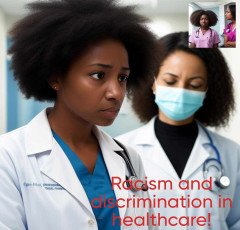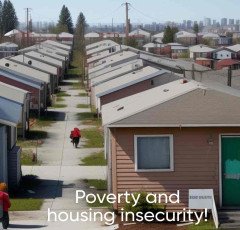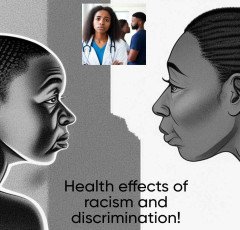
Racism and discrimination in healthcare

Racism and discrimination in the healthcare industry refer to the unfair treatment and prejudice that people or groups endure as a result of their race, ethnicity, or cultural heritage. This may show up in a number of ways, including:
Implicit bias is the term for unintentional views or prejudices that medical professionals may have toward particular racial or ethnic groups.
These attitudes or stereotypes may have an impact on the standard of care they offer.
As a result of racism and discrimination, patients may have delayed or inaccurate diagnosis, inefficient treatments, and higher mortality rates.
It can also result in mistrust between patients and medical professionals, which makes many decide not to seek treatment at all.
Healthcare institutions can combat racism and prejudice by putting in place procedures and educational initiatives that support inclusion, diversity, and cultural competence.
This may consist of:
Healthcare professionals, organizations, and legislators must work together to address racism and discrimination in healthcare.
It is crucial to make sure that everyone, regardless of color, ethnicity, or cultural background, has equitable and accessible access to healthcare.
In addition, healthcare professionals should place a high priority on listening to their patients, comprehending their distinct experiences, and meeting their individual health needs. They should try to give tailored care rather than making generalizations about a patient's race, ethnicity, or cultural background.
By enacting legislation that promotes fair healthcare access and eliminates gaps in health outcomes, policymakers can also contribute to the fight against racism and discrimination in the healthcare industry. This can be done in a number of ways, such as boosting financing for healthcare initiatives that focus on underserved populations, encouraging healthcare professionals to work in underserved areas, and tackling social determinants of health including poverty and lack of access to wholesome food.
Healthcare practitioners, organizations, and legislators need to pay attention to and take action in response to the serious problem of racism and discrimination in healthcare. Regardless of color, ethnicity, or cultural background, we can work to ensure that everyone has access to quality healthcare and better health outcomes by encouraging cultural competence, diversity, and inclusion, offering equitable care, and addressing social determinants of health.
It should be noted that combating racism and discrimination in healthcare necessitates a persistent dedication. It is a continuous process that calls for ongoing examination and improvement rather than a one-time remedy.
To understand that racism and prejudice take many different forms and affect numerous communities in different ways.
Healthcare organizations and providers must cooperate to address these many forms of prejudice as well as the unique requirements of various communities.
As an effort to combat racism and prejudice in the healthcare industry, to give priority to the voices and viewpoints of people from racial and ethnic minority groups. To ensure that solutions are successful and culturally appropriate, it is essential to pay attention to their voices and include them in the creation of policies and initiatives.
A concerted effort from healthcare providers, organizations, and policymakers is necessary to address racism and discrimination in healthcare. We can work to ensure that everyone receives quality healthcare and better health outcomes by putting a priority on cultural competence, diversity, and inclusion, providing equitable care, addressing social determinants of health, and involving the perspectives of people from minority communities.
Holding healthcare organizations and providers responsible for resolving racism and discrimination in healthcare is crucial. This can involve establishing quantifiable objectives and monitoring progress toward resolving inequities in health outcomes, enacting sanctions against healthcare professionals who act in a racist or discriminatory manner, and setting up channels for patients to report such incidents.
A broad strategy involving healthcare providers, organizations, governments, and patients is necessary to address racism and discrimination in the healthcare industry. We can work to create a healthcare system that is accessible, equitable, and responsive to the needs of all people, regardless of their race, ethnicity, or cultural background, by promoting cultural competence, diversity, and inclusion, providing equitable care, addressing social determinants of health, involving minority communities, and holding healthcare providers and organizations accountable.
Must recognise the systematic and historical causes of the widespread use of racism and prejudice in the healthcare industry.
This includes the results of laws like redlining, which restricted access to decent housing, a good education, and employment possibilities for minorities. In minority areas, these policies have facilitated the growth of healthcare deserts.
The underlying problems that have caused these discrepancies to persist must also be addressed in order to alleviate racism and prejudice in the healthcare industry. This can involve tackling economic inequality, expanding access to affordable housing and education, and investing in enterprises owned by minorities. In order to address health disparities, healthcare organizations and clinicians should also work to build relationships with the communities they serve. They can also cooperate with local leaders in this regard.
A thorough strategy that takes into account the systemic and historical factors that have contributed to these inequities is needed to address racism and prejudice in the healthcare industry. We may strive toward developing a healthcare system that is equitable, accessible, and responsive to the needs of all people, regardless of their color, ethnicity, or cultural background, by investing in minority communities, addressing economic injustice, and working with community leaders.
Must understand that eliminating racism and prejudice from the healthcare industry is not only morally required, but also a public health concern. Healthcare expenses go up, productivity goes down, and economic growth is slowed down as a result of health disparities and inequities. We can decrease healthcare expenses, enhance the general health of our society, and enhance individual and community health outcomes by addressing these inequities.
For a healthcare system to be accessible, equitable, and responsive to the needs of everyone, regardless of race, ethnicity, or cultural background, addressing racism and prejudice in healthcare is crucial. We can work towards establishing a society in which everyone has the chance to live a healthy and fulfilling life by fostering cultural competence, diversity, and inclusion, providing equitable care, addressing social determinants of health, involving minority communities, holding healthcare providers and organizations accountable, and addressing systemic issues.
To point out that healthcare companies and providers do not have primary responsibility for resolving racism and discrimination in the industry.
By becoming informed about how racism and prejudice affect healthcare, fighting for laws that support fair access to care, and reporting discrimination, individuals may also help address these problems.
By interacting with people from various backgrounds, questioning their own prejudices and presumptions, and supporting companies and organizations that place a priority on diversity and inclusion, individuals can also contribute to the promotion of diversity and inclusion in their communities.
Healthcare professionals, organizations, legislators, and individuals must work together to address racism and discrimination in healthcare. We can work towards developing a healthcare system and society that are inclusive, equitable, and responsive to the needs of all individuals, regardless of their race, ethnicity, or culture, by promoting cultural competence, diversity, and inclusion, providing equitable care, addressing social determinants of health, involving minority communities, holding healthcare providers and organizations accountable, addressing systemic issues, and educating and advocating for change.
Recognizing that eliminating racism and discrimination in healthcare necessitates continual efforts to ensure that progress is maintained is also crucial. This may entail routine assessments of healthcare policies and procedures to spot and resolve any potential prejudice or discrimination.
Healthcare professionals and staff should get continuing training and education on matters relating to diversity, cultural competency, and implicit prejudice.
This may support the development of a more equal and inclusive healthcare system where everyone is treated with respect and value.
Must understand that there is always more to be done in the battle against racism and prejudice in the healthcare industry. We can work toward a healthcare system that is truly inclusive, equitable, and responsive to the needs of all people by continuing to hear the voices of marginalized communities, prioritizing cultural competence and equity in healthcare, and committing to ongoing efforts to address racism and discrimination.
It takes a team effort from healthcare professionals, organizations, legislators, and individuals to address racism and discrimination in healthcare because it is such a complicated and multidimensional problem. Promoting cultural competence, diversity, and inclusion is one aspect of this. Others include providing equitable care, addressing social determinants of health, involving minority communities, holding healthcare providers and organizations accountable, addressing systemic issues, educating and advocating for change, and continuing efforts to ensure that progress is maintained.
By addressing these problems, we can endeavor to build a society and healthcare system that is welcoming, equitable, and sensitive to the needs of all people, regardless of their race, ethnicity, or cultural heritage. Together, we can improve people's lives and communities, and we can build a future where everyone has the chance to live.
It is crucial to recognize that the fight for racial and social justice as a whole encompasses many different issues, including racism and discrimination in the healthcare industry. Addressing problems like economic inequality, educational inequities, and criminal justice reform, all of which have a big impact on health outcomes and access to healthcare, is part of this.
We can build a future where everyone, regardless of race, ethnicity, or cultural background, has access to the resources and opportunities they need to live a healthy and fulfilling life by acknowledging the interconnected nature of these issues and working towards a more just and equitable society.
A critical first step in building a more just and equitable society is addressing racism and prejudice in the healthcare industry.
We can work toward a healthcare system and society that are truly inclusive, equitable, and responsive to the needs of all people by promoting cultural competence, diversity, and inclusion, providing equitable care, addressing social determinants of health, involving minority communities, holding healthcare providers and organizations accountable, addressing systemic issues, and maintaining ongoing efforts to ensure progress is maintained.
In the end, combating racism and prejudice in the healthcare industry calls for a strong commitment from every citizen to work towards a more just and equal future. Individuals, healthcare professionals, organizations, lawmakers, and community leaders all have a part to play in bringing about substantive change.
We can confront our own prejudices and presumptions, lobby for laws that encourage fair access to healthcare, and report incidents of discrimination.
We can also educate ourselves on topics relating to racism and discrimination in the healthcare industry. We may also work to promote companies and associations that place a high priority on diversity and inclusion in our communities.
Promoting cultural competence, offering equitable care, addressing social determinants of health, including minority populations, holding themselves accountable, and addressing systemic issues that lead to health inequalities are all responsibilities of healthcare practitioners and organizations.
By developing laws that support equal access to healthcare, addressing social determinants of health, and encouraging diversity and inclusion in healthcare settings, policymakers can help combat racism and prejudice in the industry.
Community leaders can seek to address socioeconomic determinants of health, encourage cultural competence and diversity, and interact with minority communities to better comprehend their needs and viewpoints.
All societal members must work together to address racism and discrimination in the healthcare industry. We can work toward a healthcare system and society that are truly inclusive, equitable, and responsive to the needs of all people by cooperating in the promotion of cultural competence, diversity, and inclusion, providing equitable care, addressing social determinants of health, involving minority communities, holding healthcare providers and organizations accountable, addressing systemic issues, and committing to ongoing efforts to ensure progress is maintained.















 SEO Checklist
SEO Checklist  Sennheiser
Sennheiser  NordVPN
NordVPN  Online Technology Classes
Online Technology Classes  Best Home Appliances
Best Home Appliances  SOFAS
SOFAS  Smart Doorbell
Smart Doorbell  Amazon Best Selling Products
Amazon Best Selling Products  Only For The United States
Only For The United States  Favorite Company (Cuelinks)
Favorite Company (Cuelinks)  Men Clothing
Men Clothing  BEST SELLER TOP10
BEST SELLER TOP10  Hot Bags For Pain Relief
Hot Bags For Pain Relief  ELECTRONIC ACCESSORIES
ELECTRONIC ACCESSORIES  NordLocker
NordLocker  TitTok Revolution
TitTok Revolution  Unreal Engine 5 For Beginners Learn The Basics Of Virtual Production
Unreal Engine 5 For Beginners Learn The Basics Of Virtual Production  1150+Trendy kids coloring pages Bundle
1150+Trendy kids coloring pages Bundle  One World Collection
One World Collection  Best Robotic Vacuum Cleaners
Best Robotic Vacuum Cleaners  Hello Theme
Hello Theme  Acer Laptop
Acer Laptop  Graphics & Design
Graphics & Design  RPM 3.0
RPM 3.0  ASPINAL LONDON
ASPINAL LONDON  Best Sellers On Amazon
Best Sellers On Amazon  All Wireless Products
All Wireless Products  Creative Brief For Video Shoot
Creative Brief For Video Shoot  Top Rated From Amazon
Top Rated From Amazon  The Click Engine
The Click Engine  ASUS Laptop
ASUS Laptop  The Secret Email System
The Secret Email System  Women Fashion
Women Fashion  Best Selling Books
Best Selling Books  Artificial Intelligence
Artificial Intelligence  Unlimited access to classes on illustration, photography, design, film, music
Unlimited access to classes on illustration, photography, design, film, music  NordPass
NordPass  Online Marketing
Online Marketing 
















